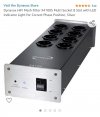This is exactly the kind of response I was looking for! You made clear points and I believe you set the bar for others who are also wondering about power conditioners. Thank you so much!
When you say:
Would I put a line conditioner between the wall and my Parasound HCA-2200 II amplifier, with its two 1.2KVA transformers and 110,000 µf of power supply capacitors? Absolutely not! A line conditioner would impede the amplifier's power supply from doing it's job. (Pun intended)
Aren't the amplifier's power supply and transformers going to function normally anyway?
Does that mean worse performance? I have read about power line conditioners robbing systems of dynamics and punch. And yes, they are subjective terms....but people claim to have noticed differences before and after.
In theory anyway, wouldn't slightly cleaner power place less strain on the audio components, leading to maximum performance? So in other words, line conditioned power going in to an amplifier wouldn't have to be regulated as much by the power transformer. In audio, I guess they say the shortest path is the best. So in this case, we're trying our best for that...
I hope I made sense.


